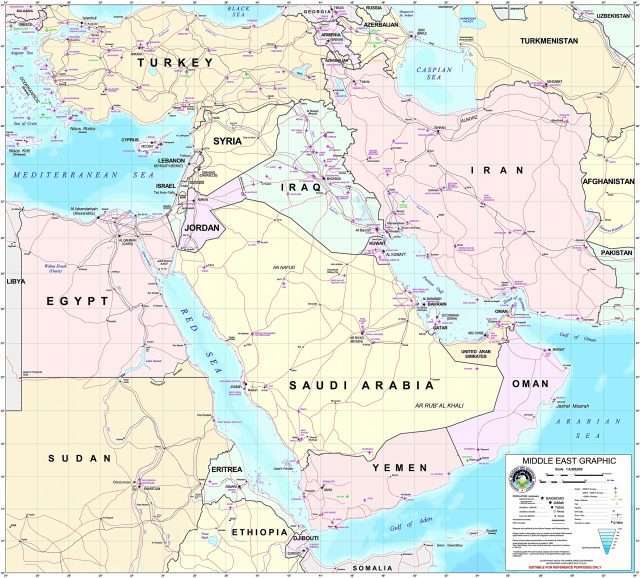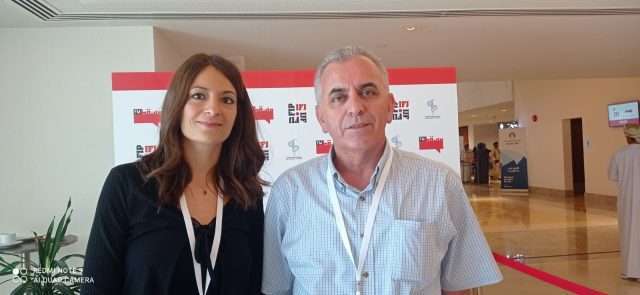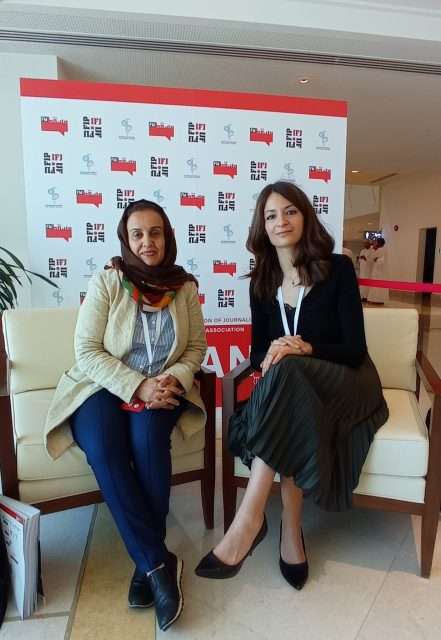
Geopolitical Report ISSN 2785-2598 Volume 20 Issue 5
Author: Silvia Boltuc
During the 31st World Congress of IFJ, we discussed with Iraqi, Syrian and Yemenite representatives the situation in their countries, focusing on society, media and the impact of regional and international geopolitics.
The Middle East has an undeniable strategic role in the international geopolitical chessboard. In the last two decades, the Middle East region has been devastated by local conflicts, the armed intervention of external actors, the confrontation between Iran and Saudi Arabia, the spread of terrorist groups such as the Islamic State, protest movements that culminated in the phenomenon of the so-called Arab Spring of 2011, and the interests of international companies for the significant regional hydrocarbon resources.[1]
The area presents a high geopolitical risk: civilian wars in Syria and Yemen continue to cause thousands of victims and refugees; in Lebanon, local authorities seem to be unable to cope with the political and economic; in Iraq, demonstrations against the central power have led to early elections that would not guarantee internal stabilisation, while for the Gulf countries there is the uncertainty of a future that cannot be based only on oil and natural gas revenues, but on economic diversification which to date still appears to be far from the desired goals.
In Muscat, the capital of Oman, more than 260 journalists from all over the world gathered to take part in the 31st World Congress of the International Federation of Journalists (IFJ), an event that not only focused on the difficulty of working as a journalist in an international context characterised by conflicts and threats to press freedom, but also looked at the regional and international political landscape.[2]
Since we are interested in understanding the current dynamics of the Middle East region, especially those of Syria, Yemen and Iraq, we met the representatives of the Arab world, focusing not only on the importance that the media have in the democratic and modern development of a country, but trying to understand the local perspectives and opinions about the current events that are marking the international arena such as the recent conflict in Ukraine and the consequential energy and food crisis.[3]
Contemporary Syria between external pressures and terrorism threat.
Moussa Abdelnour, president of the Journalists’ Union of the Syrian Arab Republic, first congratulated the organisers of the IFJ World Congress and then underlined that :
“There is a strong censorship on Syria and everything that happens in the country. Syrian satellite channels have been banned, and there is an embargo against research and technological development. Foreign powers (the United States and its allies) would like to hear and convey only one version of the story because they continually disappoint their citizens by telling lies and making them live in a surreal atmosphere. This is clear in the case of Syria because all those who visit our country, at the end of their trip, declare that what they have seen on the ground is completely different from what the media transmitted”.
Syria has been facing a problematic internal situation for years which, following the 2011 protests, led to a civil war and the rise of various terrorist groups such as the Islamic State.[4]
“When they (foreign powers) failed in their military war against the Syrian government, the conflict changed in many forms”, Abdelnour said. “The sanctions are the first war imposed against the Syrian people. There is the famous double-standard policy relating to everything about Syria, but I would like to say that we will resist, and the Syrian people will defeat any threats abroad. Although the U.S. and Turkish occupation of Syrian territory has supported various terrorist groups, these governments have been defeated, and economic sanctions are another tool of war that will not yield any results. We want to thank all those who support the Syrian people. They are true friends and believe in international law. The Russian Federation, China, the Islamic Republic of Iran, and Lebanon aided and supported Syria. Our country paid this high price because of our positions on international issues, such as supporting Palestinians against Israeli occupation and deprivation of their freedom. As a result, Israel is behind all the recent problems the Syrian government has faced since 2011. Unfortunately, Israel continues to threaten the Palestinian people, but the international community appears to be blind and does not listen to the screams of Palestinians for help.“.

Yemen: an endless humanitarian disaster
Fatima Mutahar, the representative of the journalists of Yemen and Head of Activities Committee and Executive Director, described a worrying situation in the country, which has been experiencing an ongoing humanitarian and social crisis for years.[5]
“The situation in Yemen is getting worse every day “, Mutahar declares during our meeting, “hunger is a widespread problem in the country, especially for children. The conflict negatively affected the social and health system and infrastructure. It is not easy to guarantee basic needs such as food, health services and electricity. For years, the Yemeni people have lost their jobs and wages. In areas under Houthi’s control, for example, people are not paid for more than six months, and after this long period, they usually receive a total amount of half of their regular salary (about $ 50). The war in Yemen has become the grave of the younger generations who go to fight only to feed their families. Some of these families sacrifice their children whose death as ‘martyr’ might guarantee the family the necessary compensation to survive.“.
It is undeniable that the future of Yemen is unpredictable and far from being positive. Regarding the media and journalism situation in a country that has experienced war and fighting for years, Fatima Mutahar admitted that:
“journalists are often persecuted because their job is to tell the truth about the conflict and the consequences of the consequences embargo. In the past, we as journalists have worked for justice and to improve our legal system and our lives, but today we strive to survive and get our wages back. We are in the eighth year of the war, and everything done in the past now seems to have vanished. In the past Yemeni women worked and fought to improve their living conditions and guarantee social justice while also holding prestigious positions in government and public institutions. Nowadays, they are alienated from society and experience great suffering and work only to find food for their children.“.
The Yemen war often does not find space in the media, even if the international community has tried to deal with the local humanitarian crisis through aid programs and the allocation of funds. This money, according to Mutahar,
“would have been used to finance development projects and help the local population. Unfortunately, there is rampant corruption in Yemen, and therefore these humanitarian funds often end up in the pockets of a few people, and Yemeni citizens do not receive benefits from the billions of dollars sent to the country. For example, in social networks, you can usually read the comments of people who complain about the disappearance of monetary funds intended to support and help the Yemeni population.“.[6]
Talking about the neighbouring Sultanate of Oman, the Yemeni perception is positive about the role Muscat has tried to play in the regional pacification process.[7]
“We appreciate Omani efforts and role in promoting the peace process and bringing the warring parties closer together,” said the journalist, “even if the longer the conflict lasts, the more complicated the situation will be for our country. Indeed, there is an obvious military stalemate nowadays, as any belligerent side involved in Yemen cannot achieve complete victory on the battlefield. Obviously, those who suffer the most from this situation are the Yemeni citizens.“.

Iraq after the October 2021 elections
Last October 2021, early elections were held due to the anti-government protests that had developed in the country, especially in the capital Baghdad and in strategic cities such as Nasiriyah, Karbala, and Basra.[8] If the internal political situation of the country is still in progress, the Islamic State represents a constant problem for the local security due to the activities of jihadist fighters focused mainly on the provinces of Kirkuk, Salaheddin and Diyala through violent attacks and improvised explosive devices (IEDs) explosion against security forces personnel, sabotage of electrical system structures, fires of agricultural territories, kidnappings, and extortion.[9]
Dr Hassan Al-Boudi, Secretary-General of the Journalists’ Union of Iraq, analysed political and security issues in the country, the local democratic process, and the media situation. He said that:
“Since 2003, the situation in the Middle Eastern country has improved thanks to a new political system that has opened up to the rest of the world and other peoples. We have managed to remove all the obstacles imposed by the old regime of Saddam Hussein, such as restrictions on the press and political activity and also on the activity of civil society. Today in the new Iraq, the doors are open to international organisations and civil societies, and there is considerable space for freedom of the press and expression. Every journalist and every Iraqi citizen can freely express their judgment on the work of the country’s leaders and politicians, a completely different situation compared to the one before 2003 when there were only two or three local and satellite channels linked to the regime. After 2003, Article 38 of the Constitution expressly declared freedom of expression, regulated the press and peaceful demonstrations, and allowed every Iraqi citizen to find a press organ or create a radio, television and satellite channel.[10] There are currently more than 50 television stations, dozens of newspapers, and many radio stations and news agencies in Iraq. All these data show a positive signal for the Iraqi press.“
Iraq has been a bulwark in the fight against terrorism, especially against the Islamic State that continues to be present in the country.[11] Speaking about local security, Hassan al-Baoudi said that:
“Iraq has defended the whole world against terrorism by being at the forefront of fighting the different terrorist organisations that wanted to lead people to obscurantism. The Iraqi people have shed their blood in the fight against terrorism.“
Talking about Baghdad’s Government and the political situation following the recent elections, al-Baoudi specified that:
“The recent Iraqi elections were early elections wanted by the Iraqi people because the need was felt. We are in a phase of building the Iraqi government and the country, and, as in all democracies, these are standard processes. The recent elections are the democratic and correct methods to form a national coalition government. Indeed, democracy in Iraq will be consolidated and will bear the desired fruits since there is no future solution for Iraq that does not include widespread consensus and democratic mechanisms.“
Sources
[1] Bülent Aras & Şaban Kardaş (2021) Geopolitics of the New Middle East: Perspectives from Inside and Outside, Journal of Balkan and Near Eastern Studies, Vol. 23(3), pp. 397-402, DOI: 10.1080/19448953.2021.1888251
[2] SpecialEurasia (2022) SpecialEurasia attends the 31st World Congress of the International Federation of Journalists in Oman. Link: https://www.specialeurasia.com/2022/05/31/specialeurasia-ifj-media-oman/.
[3] Alex Sinelshikouv (2022) The Russian-Ukrainian conflict and its impact on food and regional security, Geopolitical Report ISSN 2785-2598, Vol. 17(7), SpecialEurasia. Link: https://www.specialeurasia.com/2022/03/25/ukrine-conflict-food-crisis/; Silvia Boltuc (2022) Geopolitical scenarios of the Persian Gulf in the aftermath of the Ukrainian crisis, Geopolitical Report ISSN 2785-2598, Vol. 17(6), SpecialEurasia. Link: https://www.specialeurasia.com/2022/03/21/persian-gulf-geopolitics/.
[4] Jennifer Holleis, Kersten Knipp (2022) In Syria and Iraq IS is still capable, but no global threat, Deutsche Welle. Link: https://www.dw.com/en/in-syria-and-iraq-is-is-still-capable-but-no-global-threat/a-60549917#:~:text=The%20ongoing%20standoff%20at%20a,of%20money%2C%20fighters%20and%20ammunition.
[5] UN Office for the Coordination of Humanitarian Affairs (2022) Yemen Humanitarian Needs Overview 2022 (April 2022), Reliefweb. Link: https://reliefweb.int/report/yemen/yemen-humanitarian-needs-overview-2022-april-2022#:~:text=More%20than%20seven%20years%20of,humanitarian%20crises%20and%20aid%20operations.
[6] In the last years, the United Nations, media agencies and international organisations have several times denounced the corruption related to financial humanitarian aid. Cf. Maggie Michael (2019) UN probes corruption in its own agencies in Yemen aid effort, The Associated Press. Link: https://apnews.com/article/yemen-ap-top-news-theft-middle-east-international-news-dcf8914d99af49ef902c56c84823e30c; Annie Slemrod (2020) US, UK threaten to cut Yemen aid due to fraud and obstruction, The New Humanitarian. Link: https://www.thenewhumanitarian.org/news/2020/02/12/Yemen-Houthis-aid-corruption-UN-US-UK-Saudi; The Arab Weekly (2021) Ineptitude, corruption render Yemenis’ lives even more dire. Link: https://thearabweekly.com/ineptitude-corruption-render-yemenis-lives-even-more-dire.
[7] Alessandro Ricci (2021) The Omani Mediation: a Possible End for the Yemeni Civil War?, Middle East Political and Economic Institute. Link: https://mepei.com/the-omani-mediation-a-possible-end-for-the-yemeni-civil-war/.
[8] Al Jazeera (2022) Iraq announces final results of October parliament election. Link: https://www.aljazeera.com/news/2021/11/30/iraq-announces-final-results-of-the-october-legislative-election.
[9] Silvia Boltcu (2022) Security, social stability, and the role of the media in contemporary Iraq, Geopolitical Report ISSN 2785-2598, Vol. 20(3), SpecialEurasia. Link: https://www.specialeurasia.com/2022/06/01/iraq-media-security-society/
[10] Article 38 of the Iraqi Constitution declares: “The State shall guarantee in a way that does not violate public order and morality: First. Freedom of expression using all means.Second. Freedom of press, printing, advertisement, media and publication.Third. Freedom of assembly and peaceful demonstration, and this shall be regulated by law.”. Cf. C0nstitute Project (n.d.) Iraq’s Constitution of 2005, page 13. Link: https://www.constituteproject.org/constitution/Iraq_2005.pdf?lang=en.
[11] Daniele Garofalo (2022) Propaganda and operations of the Islamic State. Analysis of N. 339 of the weekly al-Naba. Geopolitical Report ISSN 2785-2598, Vol. 19(12), SpecialEurasia. Link: https://www.specialeurasia.com/2022/05/21/islamic-state-al-naba-339/; SpecialEurasia (2022) Islamic State’s new leader and future threats in Eurasia. Link: https://www.specialeurasia.com/2022/03/17/islamic-state-terrorism-eurasia/.
Report in media partnership with Notizie Geopolitiche. It is possible to read the Italian version at the following link: Oman. Media, società e geopolitica del Medio Oriente.



